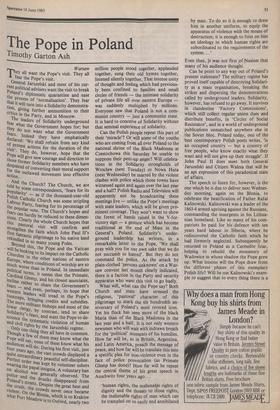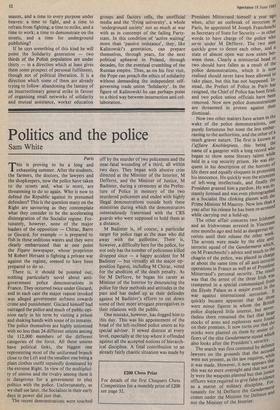The Pope in Poland
Timothy Garton Ash
Warsaw PeY all want the Pope's visit. They all fear the Pope's visit. General Jaruzelski and most of his cur- rent political advisers want the visit to break Poland's diplomatic quarantine and ease the process of 'normalisation'. They fear that h will turn into a Solidarity demonstra- tion, giving further ammunition to their critics in the Party, and in Moscow. The leaders of Solidarity underground fear what the Government hopes for; but they do not want what the Government fears. Indeed they have emphatically declared. 'We shall refrain from any kind of protest actions for the duration of the visit'. They do, however, hope that the Pope will give new courage and direction to those former Solidarity members who have despaired of converting their moral support
for the outlawed movement into effective action.
And the Church? The Church, we are told by some correspondents, 'fears for its Popularity' — as if the thousand-year-old Polish Catholic Church was some stripling Labour Party, fearing for its percentage of the Popular vote. The Church's hopes and fears can hardly be reduced to these dimen- sions. Clearly the whole Church hopes that this Pastoral visit will confirm and strengthen the faith which John Paul II, s first fantastic pilgrimage to his native land rekindled in so many young Poles.
Beyond this, the Pope and the Vatican
• will be looking to its impact on the Catholic Churches in the other nations of eastern Europe, where conditions of worship are so much worse than in Poland. In immediate political terms, it seems that the Primate, Cardinal Glemp, and his closest associates, incline rather to share the Government's fears — and even, perhaps, its hope that western leaders will tread in the Pope's footsteps, bringing credits and subsidies. The more militant bishops and most of the lower clergy, by contrast, tend to share Solidarity's fears, and want the Pope to de- nounce. the systematic violation of human and civil rights by the Jaruzelski regime.
Only one thing they all have in common. Though a few of them may know what the Pope will say, none of them know what his audiences will do. During his first visit, just four years ago, the vast crowds displayed a quite extraordinary peaceful self-discipline. Perfect order was kept by volunteer ushers Wearing the papal insignia. A voluntary ban on alcohol was generally observed. The Police and the drunks disappeared from Pnd's streets. Despite the great heat and the crush, the crowds never once became violent. On the Blonia, which is to Krakow what Port Meadow is to Oxford, nearly two million people stood together, applauded together, sung their old hymns together, listened silently together. That intense unity of thought and feeling which had previous- ly been confined to families and small circles of friends — the intimate solidarity of private life all over eastern Europe was suddenly multiplied by millions.
Everyone saw that Poland is not a com- munist country — just a communist state. It is hard to conceive of Solidarity without that seminal experience of solidarity.
Can the Polish people repeat this part of their 'miracle'? Or will some of the youths who are coming from all over Poland to the national shrine of the Black Madonna at Czestochowa this Saturday be unable to suppress their pent-up anger? Will celebra- tions in the Solidarity strongholds of Wroclaw (next Tuesday) or Nowa Huta (next Wednesday) be marred by the violent clashes with police which those towns have witnessed again and again over the last year and a half? Polish Radio and Television will apparently not be broadcasting these meetings live — unlike the Pope's meetings with state leaders, which will be given pro- minent coverage. They won't want to show the forest of hands raised in the V-for- victory sign — a gesture which has become traditional at the end of Mass in the General's Poland. Solidarity's under- ground leadership has written, in a remarkable letter to the Pope, 'We shall pray with you for our own sake that we do not succumb to hatred'. But they do not command the police. As the attack by plain-clothed 'persons unknown' on a War- saw convent last month clearly indicated, there is a faction in the Party and security apparatus who want this visit to go badly.
What will, what can the Pope say? Both Church and state have stressed the religious, 'pastoral' character of this pilgrimage to mark the six hundredth an- niversary of Poland's most revered icon. Yet his flock has seen more of the black Maria than of the Black Madonna in the last year and a half. It is not only western newsmen who will wait with indrawn breath for the 'political' moments of his homilies. How far will he, as in Britain, Argentina, and Latin America, preach the message of peace, and how far will he translate this into a specific plea for non-violence even in the face of police provocation (as Primate Glemp has done)? How far will he repeat the central theme of his great speech in Auschwitz four years ago...
`human rights, the inalienable rights of dignity and the threats to those rights, the inalienable rights of man which can be trampled on so easily and annihilated by man. To do so it is enough to dress him in another uniform, to equip the apparatus of violence with the means of destruction; it is enough to foist on him an ideology in which human rights are subordinated to the requirements of the system...'
Even then, lit was not first of Nazism that many of his audience thought.
Can he point to any way out of Poland's present stalemate? The military regime has proved itself capable of destroying Solidari- ty as a mass organisation, breaking the strikes and dispersing the demonstrations called by underground leaders. Solidarity, however, has refused to go away. It survives in clandestine 'Factory Commissions', which still collect regular union dues and distribute benefits, in 'Circles of Social Resistance', and in a world of underground publications unmatched anywhere else in the Soviet bloc. Poland today, one of the best contemporary Polish poets writes, 'is an occupied country — but a country of free people, who know exactly what they want and will not give up their struggle'. If John Paul II does meet both General Jaruzelski and Citizen Walesa that will be an apt expression of this paradoxical state of affairs.
The speech to listen for, however, is the one which he is due to deliver next Wednes- day morning, again on the Blonia, to celebrate the beatification of Father Rafal Kalinowski. Kalinowski was a leader of the 1863-4 armed uprising against the Russians, commanding the insurgents in his Lithua- nian homeland. Like so many of his com- patriots he paid for his defence with ten years hard labour in Siberia, where he rediscovered the Catholic faith which he had formerly neglected. Subsequently he returned to Poland as a Carmelite friar, helping to rebuild the monastery of Wadowice in whose shadow the Pope grew up. What lessons will the Pope draw from the different phases of this exemplary Polish life? Will he use Kalinowski's exam- ple to suggest that to every thing there is a season, and a time to every purpose under heaven: a time to fight, and a time to refrain from fighting; a time to strike, and a time to work; a time to demonstrate on the streets, and a time for underground publishing?
If he says something of this kind he will point the Solidarity generation — two thirds of the Polish population are under thirty — in a direction which at least gives them some prospect of personal fulfilment, though not of political liberation. It is a direction which some of them are already trying to follow: abandoning the fantasy of an insurrectionary general strike in favour of organising small networks of solidarity and mutual assistance, worker education groups and factory cells, the unofficial media and the 'flying university', a whole 'underground society' not so much at war with as in contempt of the failing Party- state. In this condition of 'active waiting' more than 'passive resistance', they, like Kalinowski's generation, can prepare themselves, through years, for the next political upheaval in Poland, through decades, for the eventual crumbling of the Russian empire. Thus, as on his first visit, the Pope can preach the ethics of solidarity without demanding the independent self- governing trade union 'Solidarity'. In the figure of Kalinowski he can perhaps point to a third way between insurrection and col- laboration.







































 Previous page
Previous page